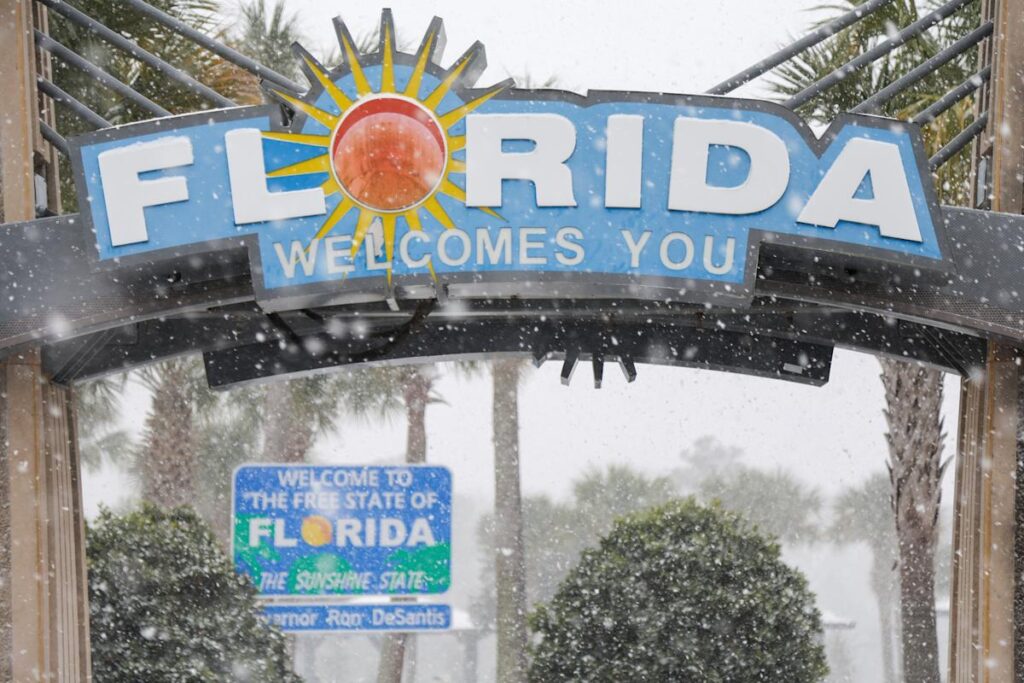As drivers on U.S. highways cross from one state to another, they often are greeted by a large “Welcome to ….” sign.
But not all drivers are welcome in every state.
In Florida, motorists with special out-of-state driver’s licenses issued to those in the U.S. illegally are not welcome to drive. Wyoming enacted a comparable ban this year. And Tennessee’s governor said he will sign similar legislation sent to his desk recently.
The message, though not literally printed on metal, is clear: “The sign says, `Welcome to Tennessee, illegal immigrants are not welcome,’” Tennessee House Majority Leader William Lamberth declared during debate.
As President Donald Trump cracks down on illegal immigration, Republican lawmakers in many states are pushing new laws targeting people lacking legal status to live in the U.S. The measures contrast with policies in 19 other states and Washington, D.C., which issue driver’s licenses regardless of whether residents can prove their legal presence.
The Justice Department is seeking to strike down one such law in New York, which shields its driver’s license data from federal immigration authorities.
States take separate roads on driver’s licenses
States are taking drastically different approaches to licensing drivers even as the federal government attempts to standardize the process.
On May 7, the U.S. will start enforcing a law passed 20 years ago that sets national standards for state driver’s licenses to be accepted as proof of identity for adults entering certain federal facilities or traveling on domestic commercial flights. Licenses compliant with the REAL ID Act are marked with a star and require applicants to provide a Social Security number and proof of U.S. citizenship or legal residency.
But states remain free to issue driver’s licenses to residents who don’t provide documentation for a REAL ID, so long as they meet other state requirements such as passing a vision exam or a driving laws test. In most states that issue licenses to people illegally in the U.S., there is no way currently to know from looking at the license whether the person is unlawfully present or simply chose not to apply for a REAL ID.
But at least some states do make a distinction. Connecticut and Delaware place special markings on driver’s licenses issued to immigrants in the U.S. illegally.
Florida limits licenses from some states
In 2023, Florida became the first state to invalidate some other states’ licenses. A law signed by Republican Gov. Ron DeSantis made it a misdemeanor punishable by a fine and potential jail time to drive in Florida with a type of license “issued exclusively to undocumented immigrants” or with markings indicating the driver didn’t provide proof of lawful presence.
As applied, the law has a limited scope. Only specially marked licenses from Connecticut and Delaware are deemed invalid, according to the website of the Florida Department of Highway Safety and Motor Vehicles.
Connecticut has issued nearly 60,700 “drive-only” licenses to immigrants unable to prove lawful presence. Delaware has not responded to an Associated Press request for such data.
Bidding to avoid Florida’s ban, Democratic Connecticut Gov. Ned Lamont last year proposed to end the special license designation for immigrants in the U.S. illegally and instead give them the same type of license as others not receiving a REAL ID. But the legislation never came to a vote.
Alabama proposes an unwelcome sign
In addition to Wyoming and Tennessee, at least a half-dozen other Republican-led states have considered legislation this year to invalidate certain types of out-of-state driver’s licenses issued to immigrants illegally in the U.S., according to an AP analysis using the bill-tracking software Plural. Such legislation passed at least one chamber in Alabama, Montana and New Hampshire and was proposed in North Dakota, Oklahoma and South Carolina.
“We want to discourage illegal immigrants from coming to or staying in Alabama,” said state Sen. Chris Elliott, sponsor of the Alabama bill that awaits House consideration. If someone illegally in the U.S. drives to Alabama, “they should turn around and go somewhere else.”
Frustrated about the legislation, Democratic Alabama state Sen. Linda Coleman-Madison added an amendment requiring highway welcome signs to contain a notice about the prohibited driver’s licenses.
“We have people that come here for a lot of events — tourists, vacation, what have you — that could be caught in this. So we need to let people know,” she told AP. “I think some of our laws are mean-spirited, and sometimes I think we just have to call it like it is.”
A balance of symbolism and substance
The legislation targeting driver’s licenses is part of a “trend of states getting involved in federal immigration enforcement issues,” said Kathleen Campbell Walker, an immigration attorney in El Paso, Texas.
It’s unclear if the laws carry much substance. Some Florida advocates for immigrants said they are unaware of specific instances where the driver’s license ban has been enforced.
But “it is a concern,” said Jeannie Economos, of the Farmworker Association of Florida, “because some people who are undocumented have specifically gone to other states where driver’s licenses are legal to get driver’s licenses to have them here.”
California is among the states where immigrants unlawfully in the U.S. can get driver’s licenses. Trump’s immigration policies have created “anxiety and fear,” said Robert Perkins, a Los Angeles area attorney who helps immigrants gain legal status.
“Even the ones that might have a California driver’s license, they’re terrified to go anywhere,” Perkins said.
___
Associated Press writers Susan Haigh and Kimberlee Kruesi contributed to this report.
Read the full article here


